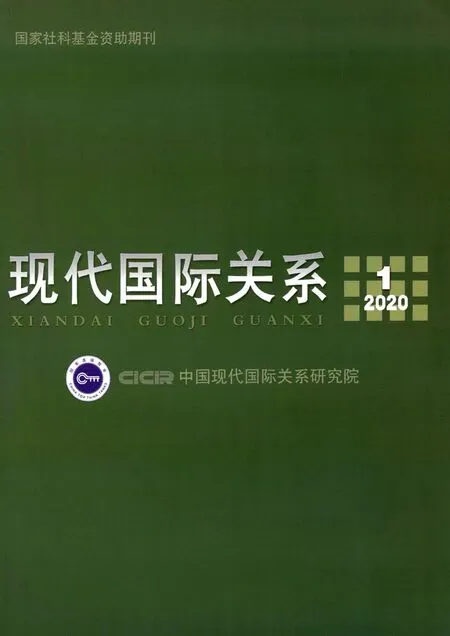Abstracts
AssessmentandProspectofInternationalSituation
Editor’sNote:The world is undergoing profound changes unseen in centuries. Challenges remain as uncertain, complex and interwoven as ever. The editorial department of Contemporary International Relations invited some experts and scholars from Beijing in January 2020 to discuss the current international developments and make predictions about the future. The viewpoints are as follows.
MajorChangesUnseeninaCenturyareUnfolding
ResearchGroup,CICIR
Abstract: International structure has experienced profound adjustments in 2019, the rise of the East and the fall of the West, the rise of the South and the fall of the North represent the general trend, new scientific and technological revolution is developing in full swing, the influence of non-state actors is on the rise, the reshaping of global order is accompanied by risks of disorder. “America first” strengthened the competition among major powers, especially the strategic game between China and the US. Regional hotspots are volatile, geopolitical tussles are complex, and the political situation of many countries is constantly fluctuating. US Unilateralism has exacerbated the deficit in global governance and made global challenges such as climate change more urgent. The spread of populism in the West reflects the institutional dilemma, separatism and extremism in some countries is also on the rise.
Keywords: major changes unseen in a century, international order, competition among major powers, global governance
KeepWritingNewChaptersofMajorCountryDiplomacywithDistinctiveChineseFeatures
ResearchGroup,CICIR
Abstract: In 2019, China’s diplomacy faced many changes in the world. In response to the new trend of the strategic competition between China and the US and the complex and volatile surrounding environment, China takes the initiative to shape and guide the international developments. In response to the adverse trend of unilateralism and protectionism of some western powers, China adheres to the multilateralism and promotes global governance through diplomatic events and multilateral diplomacy. In response to foreign interference, China has actively engaged in diplomatic struggles and resolutely safeguarded the unity of sovereignty. The 70th anniversary of National Day is an unprecedented occasion, fully demonstrating the resolve and sincerity of keeping peace, development and win-win cooperation. Over the past 70 years, China has made significant diplomatic achievements and gained valuable experience. In the future, China will build on past achievements and make persistent efforts.
Keywords: China’s diplomacy, multilateralism, take the initiative to shape and guide, build on past achievements and open up the future
MotivationsandLong-termTrendsoftheUSTechnologyDecouplingStrategy
LiZheng
Abstract: The US government has adopted a series of coercive measures on Sino-US science and technology exchanges in an attempt to promote a decoupling strategy since 2018. This strategy has resulted in historic changes in Sino-US science and technology relations. The US government attempts to obstruct the free flow of technology, data, capital, markets, and talent between China and the United States, and to change the basic logic of Sino-US scientific and technological cooperation. The decoupling strategy stems from multiple deep-seated motives, including the perception of security threats to China’s cutting-edge technology development, treating China as a competitor in global science and technology diplomacy, and promoting the backflow of the technology industry chain and the strengthening of industrial competition between the two countries. The purpose of decoupling is to occupy a favorable position in the competition of national innovation systems between the two countries. However, this strategy has its own limitations, which may not allow the United States to achieve what it wants. These limitations also provide a space for the two countries to ease their competitive relationship.
Keywords: Sino-US relations, technological competition, export control, digital economy
CompetitiveMultilateralismintheTransitionofInternationalEconomicInstitutions
YangHui
Abstracts: In recent years, there has been a new trend of competitive multilateralism in international economy. The rise of mini-multilateral institutions is on the fast track, and geopolitical competition is embedded in the process of institutional construction. The function of multilateral institutions for promoting cooperation and reducing uncertainty among states has been weakened. While their roles as strategic tools for hegemonic powers has been strengthened. As a new form of multilateralism, competitive multilateralism is the result of structural factors such as the failure and reform deadlock of some global multilateral institutions, the expansion and reconstruction of global value chains, and the return of strategic competition among great powers. With competitive multilateralism becoming a normal phenomenon in international economy, international economic order will present a trend of fragmentation, regionalization, and the renegotiation and reconstruction of international rules. More attention should be paid to competition management and realization of responsible competition in international economic governance in the future.
Keywords: international economic institutions, competitive multilateralism, WTO reform, strategic competition
(Edited by Zhang Yimeng)

